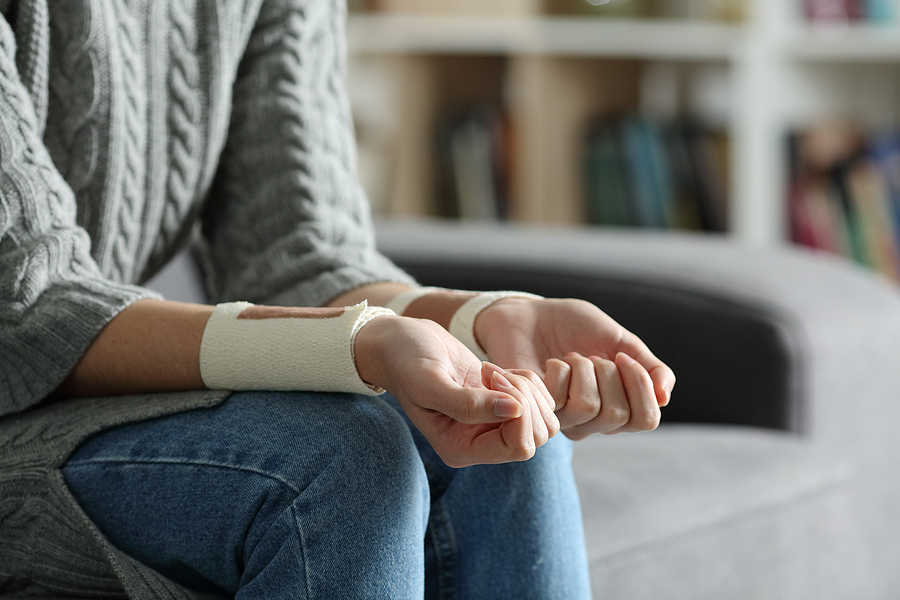Self-harming behaviours are a way that people may adopt in an attempt to ease emotional pain. Typically, people who engage in self-harming behaviours do not intend for their actions to cause an end to their lives. However, that is not to say that this type of behaviour is not associated with suicidal tendencies. In fact, self-harming behaviours should always be taken seriously.
Recognising self-harming behaviour
Self-injury is defined as self-inflicted bodily harm that is non-suicidal but severe enough to induce tissue damage or leave long-lasting scars. Self-injury is a powerful statement of an individual’s psychological distress and indicates intense and overwhelming feelings. It is often a cry for help as the individual in distress attempts to communicate or relieve their painful emotions by balancing it with physical pain.
The most common form of self-harm is cutting, where an individual uses a knife, razor blade or other sharp objects to deliberately cut or scratch themselves. Apart from cutting, some other common forms of self-injury include hair pulling, head banging, forceful scratching or hitting one’s body against objects. While risky behaviours such as alcohol abuse or unsafe sex may not necessarily be categorised as self-injury, they do pose as risk factors for future self-harming behaviour.
Signs and symptoms
Individuals who engage in self-harming behaviours often try to hide it, making it sometimes difficult to detect. However, here are some common signs and symptoms to look out for:
- Wearing long-sleeved clothing and long pants even in the warm weather
- Low self-esteem and negative self-talk (for example, constantly putting themselves down or displaying feelings of worthlessness)
- Scars that occur in a pattern or often appear in one area of the body (for example, the wrists or thighs)
- Has trouble controlling one’s emotions which may lead to outbursts or impulsive behaviour
What leads to self-harm?
As mentioned earlier, self-injury is often a mechanism or outlet for coping with emotional distress. Research has found that self-harm is most common among youths, especially young teenage girls. In fact, a study conducted in 2019 has found that 1 in 3 young adults in Singapore are engaged in self-harm.
Unsurprisingly, self-harm is a complex issue that is often associated with other mental health disorders such as anxiety, depression and eating disorders. Some individuals may intentionally hurt themselves to express feelings of hopelessness or out of guilt and shame, while others may be looking to “feel something” by harming themselves physically because they tend to feel numb or empty.
Some of the possible triggers that could lead to people self-harming include:
- Having experienced being bullied
- Trouble at home (for example, dysfunctional families)
- Feelings of worthlessness or hopelessness
- Low self-esteem
- Coping with grief and loss
- Physical, sexual or emotional abuse
- Pressure at school or work
- Breakups and/or toxic relationships
- Failing to meet parents’ or teachers’ expectations
- Feelings of abandonment and/or rejection
Overcoming it and seeking help
Self-harming behaviour should always be taken seriously. While most individuals who self-harm do not intend to end their lives by hurting themselves physically, when left untreated for a long time, self-harm can result in an increase in the risk of developing suicidal thoughts. Moreover, seeking professional treatment can help identify and treat any potential underlying mental health disorders before they develop to become too severe.
Psychotherapy is an effective treatment for self-harming behaviours. A suite of psychotherapy techniques such as cognitive behavioural therapy (CBT), eye movement desensitisation and reprocessing (EMDR), gestalt therapy, schema therapy and more can be adopted to work on resolving the root causes of an individual’s issues with abandonment and rejection to help them overcome and replace self-harming behaviours with healthy coping mechanisms.
Conclusion
If you or someone you know is engaging in self-harming behaviours, our qualified psychotherapist at Emotional Wellness can help you out. We offer professional counselling in Singapore for a variety of issues such as depression, anxiety, grief, PTSD, eating disorders, youth counselling and more. We adopt integrative counselling and psychotherapy techniques that can help you regain control of your emotions and free you from emotional distress.
Fix an appointment with us today.






